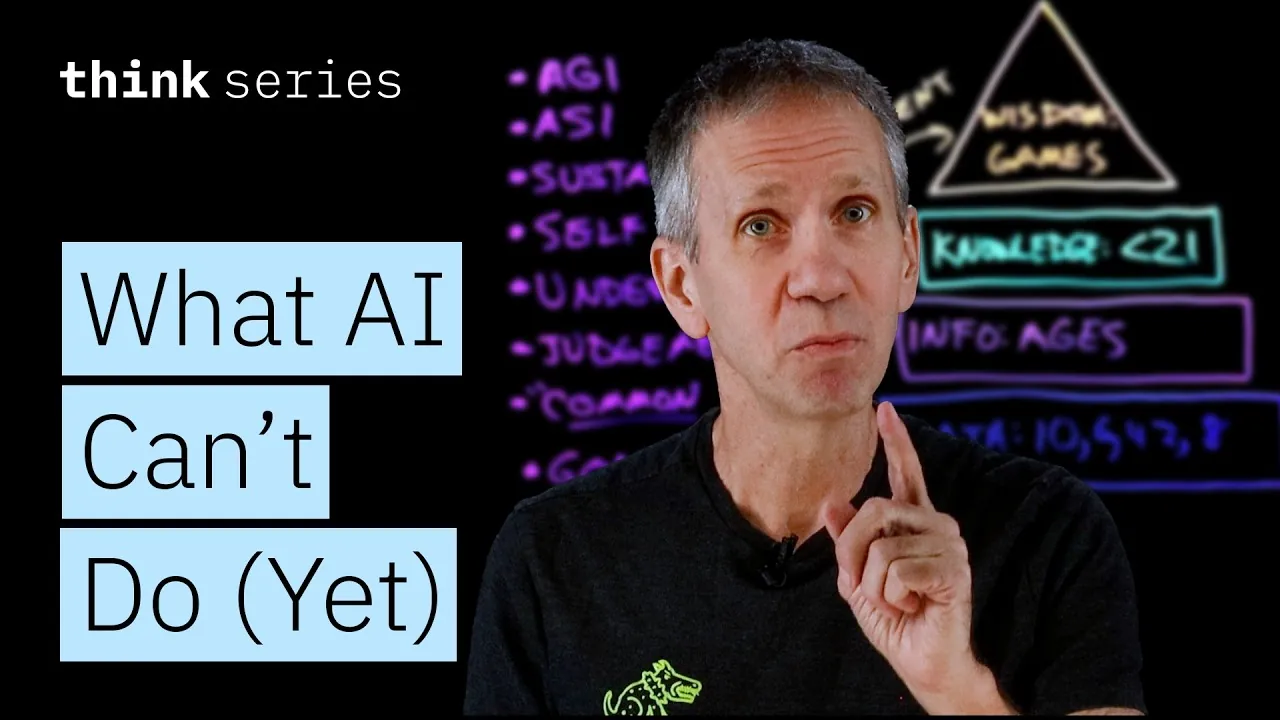
What if the machines we build to imitate human intelligence are both amazing and limited in some ways? AIs wow us with their ability to compose symphonies, ace strategy games, and have eerily human-like conversations, but they stumble in areas we take for granted, such as common sense, ethical reasoning, and true adaptability. The rise of tools like generative AI and natural language processing (NLP) is causing both awe and anxiety, making us question things. Are we on the brink of creating machines that think like us, or are we simply refining tools that require constant human guidance? The answer lies not only in what AI has achieved, but also in the limits it has yet to surpass.
In this feature, IBM Technologies explores the notable milestones AI has reached, from creative enterprises in the arts and literature to new applications in real-time decision-making. But we will also face its significant limitations, including the elusive goal of achieving it. Artificial general intelligence (AGI) and the ethical dilemmas that arise as machines take on more human-like roles. In the process, we will uncover the delicate balance of: Human ingenuity and machine efficiencyAnd why the future of AI depends more on complementing human intelligence than surpassing it. As you read on, consider the following: What does it mean for humanity that our most advanced creations still rely on us to define their purpose?
AI achievements and challenges
Key points:
- AI has made remarkable advances in areas such as inference, natural language processing (NLP), generative creativity, real-time perception, and simulated emotional intelligence, making it more capable at specialized tasks.
- Key challenges for AI include developing artificial general intelligence (AGI), addressing sustainability concerns, mitigating problems such as hallucinations and ethical judgment, and overcoming the limitations of common sense reasoning and goal setting.
- Future directions for AI are focused on advancing AGI, creating sustainable and energy-efficient models, addressing ethical and philosophical issues, and enhancing AI's decision-making capabilities in sensitive areas.
- Human-AI collaboration is essential, with humans providing vision, creativity, and ethical guidance, and AI optimizing execution and providing efficient solutions, enabling outcomes that neither could achieve alone.
- The evolution of AI will depend on interdisciplinary efforts to address its limitations, align AI development with societal values, and unlock its incredible potential to address global challenges such as climate change and medical innovation.
Current achievements in AI
AI has demonstrated incredible capabilities across a wide range of applications and the ability to process huge data sets, identify patterns, and provide actionable insights. Some of its most notable achievements include:
- Reasoning and problem solving: AI systems such as Deep Blue and AlphaGo outperform human experts in complex strategy games, highlighting their advanced decision-making and analytical abilities.
- Natural language processing (NLP): Models like ChatGPT enable machines to understand and generate nuanced human language, powering applications such as virtual assistants, real-time translation tools, and automated content creation.
- Generative AI: AI is moving into the creative realm, creating original art, music, and literature. These outputs demonstrate a form of machine creativity that complements and enhances human ingenuity.
- Real-time recognition: Self-driving cars and robots use AI for real-time object recognition, navigation, and decision-making, allowing them to operate effectively in dynamic environments.
- Simulated emotional intelligence: AI systems can now recognize and respond to human emotions, improving user experiences in areas such as customer service, mental health support, and personalized healthcare.
While these achievements confirm that AI excels at specialized tasks, they also highlight its limitations when faced with broader, more complex challenges that require adaptability and contextual understanding.
Continuing challenges in AI
Despite its impressive advances, AI remains constrained by several significant challenges that limit its ability to achieve human-level intelligence and versatility. These challenges include:
- Artificial general intelligence (AGI): Unlike narrow AI that excels at specific tasks, AGI aims to replicate human-like intelligence across all domains. Current AI systems lack the flexibility, adaptability, and contextual understanding needed to achieve this milestone.
- Sustainability: The energy consumption of large-scale AI models raises concerns about their environmental impact. To ensure the long-term viability of AI, it is important to develop energy-efficient systems.
- Hallucination: Generative AI models can produce inaccurate or fabricated outputs, compromising reliability and reliability in critical applications.
- Self-awareness and consciousness: AI lacks understanding of its own existence, raising philosophical and technological questions about whether true awareness is achievable or even desirable.
- Ethical judgment: AI has a hard time making subjective or moral decisions, especially in complex real-world scenarios where ethical considerations are paramount.
- Common sense reasoning: AI is often unable to apply intuitive, generalized reasoning to unfamiliar situations, limiting its ability to effectively adapt to new situations.
- goal setting: While AI is great at performing predefined tasks, it has difficulty defining, prioritizing, and pursuing overarching goals on its own.
- Sensations and emotions: AI lacks true sensory awareness and emotional depth, which limits its ability to reproduce or fully understand human experience.
These challenges highlight the need for continued research, innovation, and multidisciplinary collaboration to address AI's shortcomings and realize its full potential.
The limits of AI: Generative AI, NLP, AGI, and what’s next?
Deepen your understanding of artificial intelligence (AI) with additional resources from our extensive article library.
Future direction of AI
The future of AI lies in exploring new possibilities that can redefine the role of AI in society while addressing current limitations. The main areas of focus are:
- Evolving AGI: Researchers are working to develop AGI systems capable of human-level reasoning, adaptability, and cross-domain problem solving.
- Sustainable AI: Efforts to create energy-efficient models and reduce the environmental footprint of AI technologies are essential for their long-term sustainability.
- Ethical and philosophical questions: Addressing issues such as consciousness, self-awareness, and moral reasoning will play a pivotal role in shaping the ethical development of AI.
- Enhanced judgment: Improving AI's ability to make qualitative and ethical decisions will expand its applications in sensitive areas such as medicine, law, and governance.
- Synergy between humans and AI: Fostering collaboration between humans and AI enables the creation of systems that combine machine efficiency with human creativity and ethical insight.
These advances will require a concerted effort by researchers, policymakers, and industry leaders to ensure that the development of AI is aligned with society’s values and priorities.
The role of human-AI collaboration
Human-AI collaboration is central to realizing the full potential of artificial intelligence. While AI is great at processing data, optimizing processes, and performing tasks with precision, humans bring creativity, ethical judgment, and purpose. This partnership can be summarized as follows:
- Humans define “what” and “why.” We provide the vision, creativity, and ethical considerations to drive AI applications toward meaningful and impactful goals.
- AI decides the “how”. AI optimizes the execution of tasks, analyzes complex datasets, and delivers solutions with unparalleled efficiency and accuracy.
By harnessing the complementary strengths of humans and AI, we can achieve results that neither could achieve alone. This synergy is especially important when addressing complex global challenges, from climate change to medical innovation.
For the future
AI has made incredible advances, demonstrating powers of reasoning, creativity, and real-time perception that were previously unimaginable. However, significant challenges remain, including the pursuit of AGI, the need for sustainable practices, and the resolution of ethical dilemmas. As AI continues to evolve, human-machine collaboration will be critical to overcoming these obstacles and unlocking new possibilities. Through continued research, innovation, and thoughtful integration into society, AI will become a tool that aligns with human values and aspirations, and its incredible potential will be fully realized.
Media credit: IBM Technologies
Filed Under: AI, Technology News, Top News
Sale on the latest geeky gadgets
Disclosure: Some articles contain affiliate links. If you buy something through one of these links, Geeky Gadgets may earn an affiliate commission. Learn about our disclosure policy.




